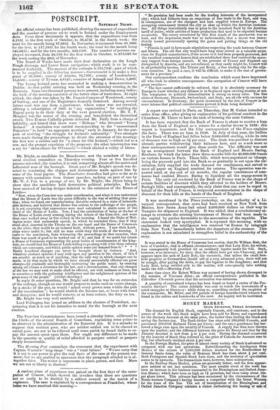A report was revived in Paris, on Thursday, that M.
Guizot intended to retire from office, after giving an explanation of his political conduct in the Chambers; M. Thiers to have the task of forming the next Cabinet.
It has been reported that the Bank of France is about to receive a Ioan from the Bank of England, as a return for a similar favour in 1839: this report is inaccurate, and the City correspondent of the Times explains the facts. There was no loan in 1839. In July of that year, the bullion in the Bank of England had fallen below 3,000,0001. sterling, while its rate of discount was as high as 51, per cent. The drain was ascribed to distrust abroad; parties withdrawing their balances here, and as much more as their correspondents would give them credit for. The difficulty was met by an arrangement between the Bank of England and Messrs. Baring, Brothers, by which the latter drew three-months bills for 40,000,000 francs on various houses in Paris. These bills, which were negotiated on 'change, being the proceeds paid into the Bank so as gradually to act upon the cir- culation, fully supplied the trade demand for remittances, and served to meet all paper on England remitted for returns. The operation was re- pentad until, at the end of six months, the regular remittances of CO3:11-- merce had enabled Messrs. Baring to liquidate all the engagements in Paris. The only aid rendered by the Bank of France was in the shape of certain facilities of discount which they afforded to the holders of Messrs. Baring's bills; and consequently, the only claim that can now be urged in behalf of the Bank of France, is reciprocal accommodation in the shape of discount for their bills at the hands of the Bank of England.


































 Previous page
Previous page